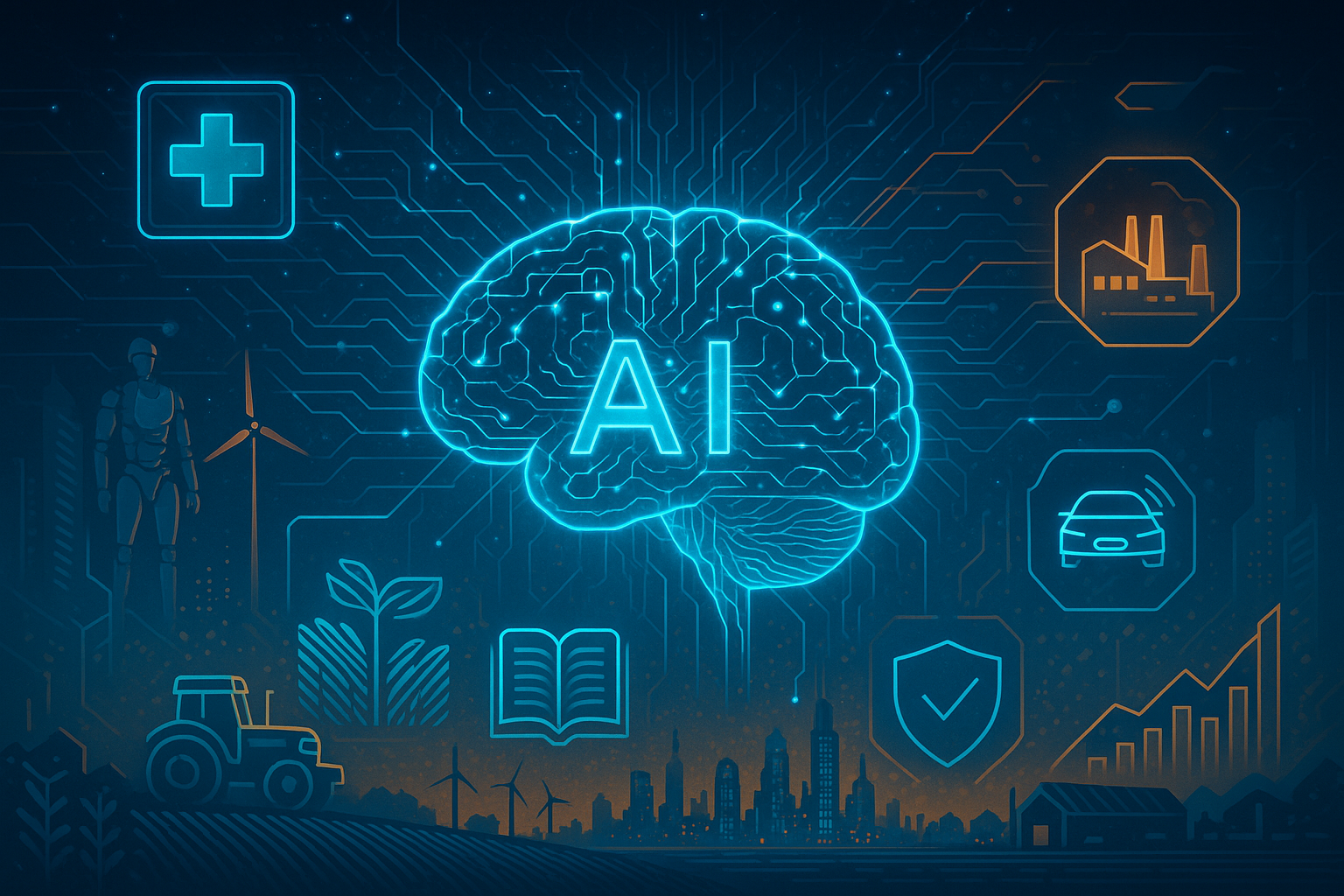The rapid advancement of Artificial Intelligence (AI) is shaping our society in almost every aspect of life. From business and healthcare to education, AI is revolutionizing the way we work, communicate, and live. This article highlights the key trends and developments in AI for 2025, offering a glimpse into the future of this transformative technology.
The New Generation of AI Models
AI models in 2025 have seen a remarkable leap in performance. Improved algorithms, enhanced computational power, and optimized data usage enable these systems to tackle even more complex tasks. A notable example is in predictive analytics, where AI can forecast future events and behaviors based on large data patterns. This is already proving beneficial in areas like healthcare, where AI is aiding in early disease detection.
Automated decision-making has also seen significant improvements. Modern AI systems can analyze complex scenarios and provide actionable insights, revolutionizing sectors like finance, logistics, and healthcare.
AI Agents Revolutionizing the Workforce
A key trend in 2025 is the increasing use of AI agents that take over repetitive tasks and redesign business processes. These autonomous AI systems are becoming more powerful and independent, making life easier at home and in the workplace. AI agents are capable of solving complex problems and driving innovation across various industries.
According to Gartner, agent-based AI systems are among the top technology trends for 2025, with the potential to revolutionize workflows. These agents not only automate simple tasks but also optimize complex workflows, tailored to the specific needs of businesses. The most significant impact is being seen in sales, where autonomous AI agents are improving processes like lead qualification and automated proposal creation.
AI Governance and Ethical Challenges
As AI technologies become more widespread, there is a growing need for clear regulations and ethical guidelines. The EU AI Act, effective in 2025, sets new standards for the ethical use of AI, categorizing AI applications by their risk levels and defining corresponding obligations.
Companies need to fundamentally rethink their AI strategies to align with these new legal frameworks. This includes conducting risk assessments, adhering to transparency requirements, and ensuring compliance with standards. Non-compliance could result in substantial fines, as high as €35 million.
The ethical challenges of AI are complex. Key issues include accountability, transparency, and the moral responsibility of AI systems when making decisions with real-world consequences. The environmental impact of AI systems is also a growing ethical concern, often overlooked in technical discussions.
AI in Business: Productivity and Transformation
In Germany, AI adoption in business is accelerating. As of 2025, 40.9% of companies use AI in their operations, a sharp increase from 27% the previous year. An additional 18.9% plan to implement AI soon, highlighting its growing strategic importance.
Particularly in industries like construction and retail, AI adoption has increased dramatically. However, sectors like manufacturing and services are also seeing over 40% usage. When we look at individual sectors, the use of AI is especially high in advertising and market research, where 84.3% of companies are already implementing AI.
AI's impact on productivity is significant, with 63% of AI-using companies reporting direct improvements in business performance. Over the next five years, companies expect an 8-16% increase in productivity due to AI, with variations depending on the industry.
AI in Finance: Personalization and Automation
In the finance sector, AI has become a driving force of innovation. Dynamic models like hyper-personalized services and automated portfolio management are replacing traditional financial solutions like static savings plans and rigid investment products. These tools can react flexibly to market fluctuations and focus on customer needs.
Nine out of ten German financial institutions are either implementing or exploring generative AI, a figure that surpasses the global average and is higher than in countries like France and the UK. Alongside personalized services, AI is automating repetitive processes in the back office, significantly reducing the workload of employees.
Klarna, a payment service provider, has successfully implemented an AI-based customer service system, handling a large portion of customer inquiries and reducing the workload of hundreds of employees.
AI in Mobility: Autonomous Driving Becomes Reality
The combination of sensors, machine learning, and artificial intelligence enables modern vehicles to navigate complex traffic situations without human intervention. Cameras, radar sensors, lidar systems, and AI-powered algorithms form the backbone of autonomous vehicles, analyzing real-time data to calculate routes and maneuvers.
Technological advancements are impressive, with manufacturers like Tesla, Waymo, Mercedes-Benz, and BMW already testing sophisticated systems on public roads. In Germany, changes to road traffic laws have paved the way for autonomous driving in regular traffic.
The benefits of autonomous driving are clear: Most traffic accidents are caused by human error. AI-driven vehicles could drastically reduce these incidents by reacting faster, more accurately, and more attentively than humans. Additionally, commuters could use travel time productively while the vehicle takes them safely from point A to point B.
AI in Healthcare: Precision and Efficiency
AI has become a transformative force in healthcare. Technological advancements offer unprecedented opportunities to revolutionize healthcare delivery, making it more effective, accessible, and economically sustainable.
AI can optimize resource allocation in healthcare by making data-driven predictions about patient admissions and hospital resource needs. This ensures that resources are available where they are most needed, reducing waste and improving care quality.
In diagnostics, AI increases accuracy and enables earlier detection, allowing for cost-effective and less invasive treatment options. AI-driven personalized treatment plans can complement traditional methods, providing more targeted and effective care while reducing the financial burden on healthcare systems.
AI in Agriculture: Smart Farming
AI is also transforming agriculture. Many farms have recognized the advantages of digitization and are increasingly adopting digital technologies.
Smart farming relies heavily on sensors to monitor crops for deficiencies, diseases, and pests. These sensors distinguish between weeds and crops, calculate fertilizer and pesticide needs, analyze soil conditions, and manage irrigation-helping farmers optimize resources and boost efficiency.
Agribots, robots that automate agricultural processes, are one of the most visible aspects of digital farming. While AI in agriculture is sometimes debated, self-learning systems are proving to be valuable in resource conservation and productivity improvement.
AI in Energy: Optimization and Sustainability
In the energy sector, AI plays a crucial role in improving energy efficiency. By analyzing large datasets, AI can identify potential savings and propose automated solutions.
AI also helps optimize the use of renewable energy. By collecting and analyzing real-time data, AI can adjust energy production to match current demand and environmental conditions.
A key advantage of AI is its ability to recognize patterns and trends in vast datasets. In the energy sector, this enables companies to precisely monitor and optimize energy consumption, resulting in significant cost savings.
AI and Cybersecurity: Opportunities and Risks
AI has significantly improved cybersecurity tools, with machine learning tools making network security, anti-malware, and fraud detection software more powerful by identifying anomalies much faster than humans. However, AI also poses new risks to cybersecurity. Malicious actors can exploit AI to create advanced malware, manipulate others for fraud, and even poison AI training data.
As AI tools become more affordable and accessible, the risks to cybersecurity are increasing, making it essential to balance innovation with robust security measures.
AI and Education: Personalized Learning
AI has the potential to radically change how we approach education. It can provide personalized learning experiences, helping students learn in ways that suit their individual needs and learning styles-whether in universities, schools, or adult education.
Early practical applications of AI aim to assist human educators, not replace them. AI could enable students to study in a way that matches their learning preferences, while also providing universities with more data on student success and areas for improvement.
Looking Ahead: The Future of AI
The development and application of Artificial Intelligence is advancing rapidly, both in Germany and globally. As companies increasingly adopt AI technologies and benefit from productivity gains, research institutions and tech giants continue to work on more powerful models.
Europe is working to create a framework through its AI strategy and the EU AI Act to foster innovation while ensuring ethical standards. The next few years will determine whether Europe can catch up in the global AI race and how these technologies will impact jobs, productivity, and society.
One thing is clear: AI will continue to transform our society, opening new possibilities across all areas of life. The challenge is to use this technology responsibly to ensure it benefits everyone.
For more insights on how AI is transforming industries, visit Best AI Tools, where we explore and review the latest AI tools that can help you stay ahead of the curve!



